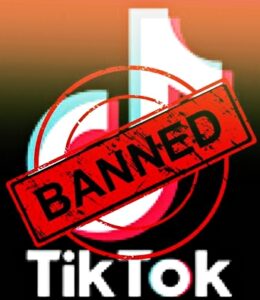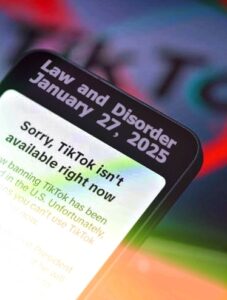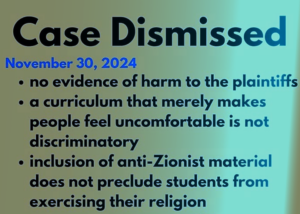Podcast: Play in new window | Download
The First Amendment And TikTok
On January 17, for the first time in modern American history, a unanimous US Supreme Court upheld a sweeping prior restraint on free speech imposed by Congress banning over 170 million users in the United States from having access to the popular social media platform TikTok that the Court itself admitted “allows users to create, publish, view, share, and interact with short videos overlaid with audio and text.” In 2023 alone, U. S. TikTok users uploaded more than 5.5 billion videos, which were in turn viewed more than 13 trillion times around the world. The avoid the ban, the law requires TikTok’s parent company, the China-based ByteDance, to divest its ownership.
From January 18 to 19, the ban was in effect for about 12 hours until Donald Trump tweeted that as President he would grant a stay of execution, pending a potential sale of TikTok. It was only 12 hours some may say, but it is estimated that during that time the ban blocked 6,750,000 videos that would have been viewed over 178,000,000 times worldwide. The ban is easily the most extensive act of censorship in human history.
Shortly after he was sworn in, Trump signed an Executive Order purporting to suspend the ban for 75 days. Serious questions have been raised whether Trump’s order is legal and enforceable. And despite his order, Apple and Google have still not reinstated TikTok at their stores preventing new subscribers from accessing TikTok.
Meanwhile, the First Amendment rights of 170 million TikTok users hang in the balance.
Guest – Ramya Krishnan is a senior staff attorney at the Knight First Amendment Institute at Columbia University and a lecturer in law at Columbia Law School. Her litigation focuses on issues related to government transparency, protest, privacy, and social media. Ramya co-authored the Knight Institute’s amicus brief in TikTok. v. Garland, one of the lawsuits challenging the constitutionality of the TikTok ban which resulted in the Supreme Court’s decision. Read Amicus Brief
—-
Federal Court Rejects Attempt To Remove Ethnic Studies Curriculum
As Israel’s war in Gaza and the West Bank rages on, the free speech battles here in the United States continue with Congress, state legislatures and college administrators trying to silence pro-Palestinian protests by conflating criticism of Israel with the odious epithet of “antisemitism.” Pro-Palestinian groups are being banned, students are being disciplined, and faculty members are being suspended and fired.
But last November, there was some hopeful news when a federal court rejected attempts by Jewish parents and teachers to remove an ethnic studies curriculum from the Los Angeles Unified School District that they had labelled “antisemitic” and “anti-Zionist.”
On November 30, 2024, in a 49-page ruling, U.S. District Judge Fernando M. Olguin wrote that a system of education “which discovers truth out of a multitude of tongues” must allow teachers and their students “to explore difficult and conflicting ideas.” He added that “we must be careful not to curb intellectual freedom by imposing dogmatic restrictions that chill teachers from adopting the pedagogical methods they believe are most effective,”
The ruling represents a welcome rebuke to the efforts of Republican state legislators and conservative parent groups to try to restrict the teaching of comprehensive American history in public schools, to ban books that examine that history as well as racism, sexism, and LGBTQ issues, and to eliminate programs that seek to ensure diversity, equity, and inclusion in American education.
In 2022, a group calling itself “Concerned Jewish Parents and Teachers of Los Angeles,” comprised of what the lawsuit calls Jewish, Zionist teachers and parents of students sued the Los Angeles Unified School District; United Teachers of Los Angeles; its president Cecily Myart-Cruz; the Liberated Ethnic Studies Model Curriculum Consortium; Theresa Montaño, the Consortium’s secretary; and Guadalupe Carrasco, its co-founder.
To discuss the important free speech and academic freedom issues involved in this case, we’ve invited the lawyer who represented the ethnic studies curriculum, Ms Montano and Ms Carrasco.
Guest – Mark Kleiman is a former activist and organizer and a long-time civil rights and human rights attorney. With extensive experience in whistleblower protection, he has brought cases that exposed massive fraud against public programs and has forced drug companies, nursing home chains, and defense contractors to repay hundreds of millions of dollars. Since 2019 he has devoted thousands of hours to defending activists, scholars, and students who have been attacked for their defense of Palestinian human rights.
————————-




